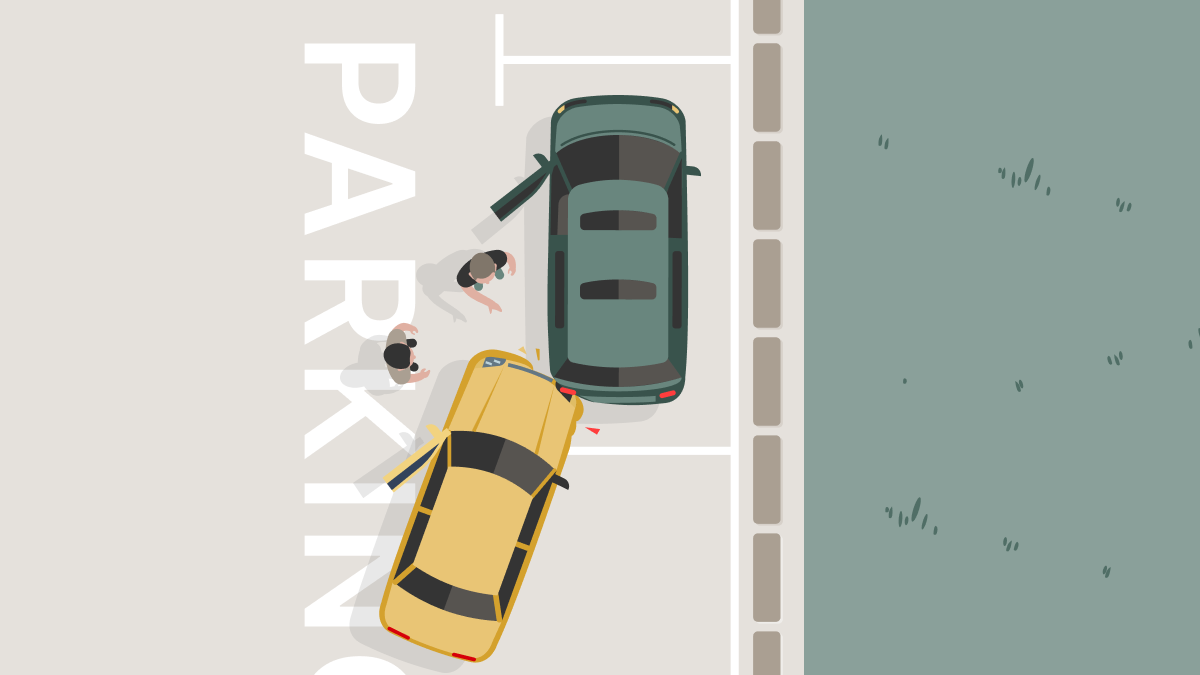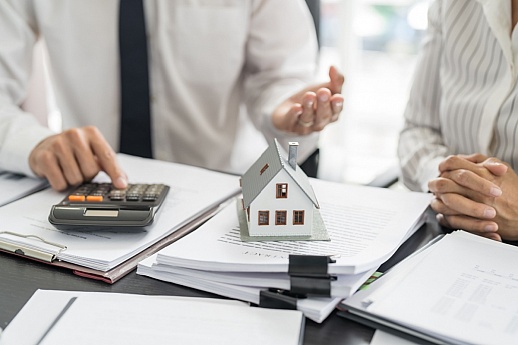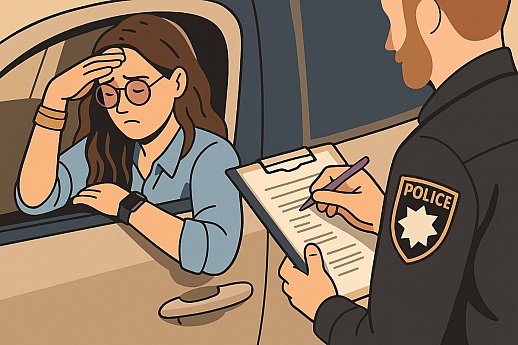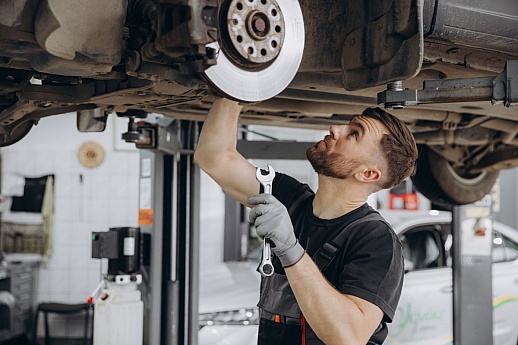Will My Insurance Rates Increase if Someone Hits My Parked Car?
Finding your car damaged after a hit-and-run can turn a good day sour in an instant. You're left with a damaged vehicle, no responsible party in sight, and a looming question: "What now?"
This guide aims to help you navigate the aftermath of such incidents, focusing on a key concern for many: Does your insurance increase after a hit-and-run?

We'll explore the steps to take immediately following the accident, the types of coverage that can help mitigate costs, and, of course, the financial impact of a hit-and-run on your insurance rates.
My Car Was Hit While Parked: What to Do?
Nothing spoils your day quite like finding your parked car damaged and the responsible party gone, leaving you thinking, "Someone hit my car while parked and left. What now?" Fortunately, we outline your next steps below:
Step 1: Document the Damage
Start by carefully examining and documenting the damage to your car. Take clear pictures from various angles, making sure to capture the extent of the damage. Also, photograph the surrounding area to provide context for where the incident occurred. You’ll need these photos when filing a police report and insurance claim later.
Step 2: Get Witness or Surveillance Evidence
Next, check the area to see if the at-fault driver left a note with their contact information. Unfortunately, not everyone will do this. If they didn’t, look for potential witnesses or security cameras that might have caught the incident.
If you find witnesses, kindly ask for their contact information, as their statements could help support your insurance claim. Similarly, if there are cameras, note their location so you can inform the police and your insurance company.
Step 3: Contact the Police
After documenting the damage and information, contact the police. When the police arrive, they will report the incident, which can also be used to support your insurance claim. The police can also help investigate the incident further and attempt to find the driver responsible for the hit-and-run.
Be sure to provide the police with all the information and evidence you have collected. Once they've completed their report, ask for a copy for your records.
Step 4: Contact Your Insurance Company
Finally, contact your insurance company to report the incident. Provide them with the police report number, your photos, and other evidence. You'll be asked to fill out a claim form, which starts the official process of getting your damage covered.
After filing a claim, an insurance adjuster will be assigned to your case to review the evidence, assess the damage, and determine your payout eligibility.
If your claim is approved, you'll be told how much money you'll receive for repairs or if your car is considered a total loss. You will likely be required to pay the deductible before your insurance company covers the remaining costs.
Does Insurance Cover Hit-and-Runs?
When your car is involved in a hit-and-run, the type of insurance determines how well you're covered. Let's break down the different insurance types to help you answer “Does insurance cover hit-and-run parked car?”
- Liability-Only/Minimum Coverage: Liability-only coverage is the most basic form of car insurance and is required in most states. If the at-fault driver is identified or leaves a note, their liability coverage might cover the repair costs for your vehicle. However, this scenario relies on the at-fault driver having liability-only coverage and being identified.
- Collision Coverage: This coverage is for damage that results from a collision, regardless of who is at fault. This type of policy can cover the vehicle's repair costs (subtracting the deductible) after a hit-and-run, even if the at-fault driver is never found.
- Underinsured/Uninsured Motorist (UM/UIM) Coverage: This type of coverage is specifically designed to protect you if you're in an accident with a driver who either doesn't have insurance or doesn't have enough insurance to cover the damages. UM/UIM coverage can cover your hit–and–run damage if the at-fault driver cannot be identified or is known but lacks sufficient coverage. Some states and policies may require a deductible, but it will usually be smaller than with collision coverage.
- Full Coverage: "Full coverage" is a combination of coverage options, including liability, collision, and comprehensive coverage. Having full coverage can provide the most protection in a hit-and-run because it includes collision coverage for your vehicle's repairs and UM coverage if the at-fault driver can't be identified or doesn't have adequate insurance. As mentioned earlier, a deductible may be required.
Unfortunately, if you don’t have collision, full, or UM/UIM coverage, you will be responsible for the damage out of pocket.
Will My Insurance Go Up If Someone Hits My Parked Car?
If you're wondering, “Will my insurance go up if someone hits my parked car?” The short answer is yes, even if the hit-and-run wasn't your fault.
Filing a claim might still increase your auto insurance premium because insurance companies base their rates on the likelihood of paying out claims in the future. By filing a claim, you may be seen as more likely to file additional claims down the line, which can result in a slight rate increase.
Although your rates may go up following a hit-and-run claim, the silver lining is that the increase will likely be relatively small if you’re not at fault.
Will My Insurance Go Up If I Hit a Parked Car?
In the unfortunate instance where you’re at fault, your first thought may be, “Will my insurance go up if I hit a parked car?” If you file a claim, your premiums are more likely to increase, and typically, the increase will be more significant than if you were not at fault.
When you're responsible, insurance companies see this as a significant indicator of risk. Consequently, your insurance provider may adjust your rates upwards to reflect this increased risk. This adjustment is not just about the single incident but also considers the potential for future claims based on your driving behavior.
At-fault hit-and-runs are taken seriously by insurers for several reasons:
- Responsibility for Damages: Causing an accident typically results in more extensive claims than being a victim of one. This includes damage to both the parked car and any potential property damage or personal injuries that may have occurred.
- Risk Assessment: Insurers use your driving record as a key factor in determining your insurance rates. At-fault incidents, especially hit-and-runs, are seen as indicators of risky driving behavior, leading to higher premiums.
- Legal and Financial Consequences: At-fault accidents often involve more complex legal and financial repercussions, including higher claims payouts and potential legal fees. This further contributes to the decision to raise premiums.
- Insurance Points: Many insurance companies use a points system to track driving behaviors and incidents. At-fault accidents can add points to your record, which typically results in higher insurance premiums.
Your insurance company will reassess your policy at renewal time, considering the new risk you pose based on the at-fault accident. The increase in your premium reflects the insurer's need to cover the higher risk of insuring a driver who has demonstrated unsafe driving behavior.
How Much Will My Insurance Go Up?
Generally, you can expect your insurance premiums to increase by about 5% to 20% following a claim. Of course, if you are at fault for the hit-and-run, the increase will be on the higher end.
However, this range isn't set in stone — several factors can influence where your rate increase falls within this spectrum:
- Severity of the Incident: The more severe the accident, the higher the potential increase. If the hit-and-run resulted in significant damage or injuries, this could lead to a higher end of the premium increase range.
- Your Driving Record: If you have a clean driving record, your insurer might be more lenient, resulting in a smaller increase. However, multiple infractions or previous claims can lead to higher increases.
- Insurance Company Policies: Each insurance company has its own method for calculating rate increases after claims. Some may have more forgiving policies, especially for first-time incidents, while others may apply stricter penalties.
- Location: Insurance regulations vary by state, which can affect how much insurers can raise your rates after an accident. In some states, the increase might be capped, while in others, insurers have more flexibility.
- Discounts: If you were receiving discounts for being a safe driver or having no previous claims, you might lose these discounts after an at-fault accident, further increasing your rate on top of the increase for the claim itself.
- Accident Forgiveness: If your policy includes accident forgiveness, your premium for the first incident might not increase, depending on the terms and conditions of your insurance agreement.
Bottom Line
Discovering your parked car has been hit and damaged can be disheartening. Whether or not you find the responsible party, does a hit-and-run affect your insurance? Generally, insurance rates increase if you file a claim, even if you're not at fault. However, having the right coverage, like collision or uninsured motorist, can mitigate out-of-pocket expenses.
FAQ
For additional hit-and-run related information, check our frequently asked questions below:
Does Car Insurance Cover Parking Lot Damage?
Yes, car insurance can cover damage that occurs in parking lots.
- Collision Coverage: Covers damages to your vehicle if you're at fault in an accident, whether with another vehicle or a stationary object.
- Comprehensive Coverage: Covers damages from non-collision incidents, such as vandalism or theft.
- Liability Insurance: If you're at fault, this covers damage to another person's vehicle or property.
- UM/UIM Coverage: If the at-fault driver doesn't have insurance or flees the scene, this coverage may pay for your damages.
Note that most coverage requires you to pay a deductible before the insurer contributes to the repair costs.
How Much Will My Insurance Go Up After Scratching Someone’s Car?
If you're at fault for scratching someone's car, your insurance premium could increase by about 5% to 20%. The exact amount varies based on:
- Your previous driving record.
- The severity of the incident.
- Your insurer's policies.
- Whether you have accident forgiveness on your policy which could mean no increase for the first incident.
Does Insurance Cover Parking Lot Dents?
Insurance can cover dents, subtracting your deductible, received in a parking lot under the following conditions:
- If another vehicle dents your car and you're not at fault, The other driver's liability insurance would cover the repairs. If the at-fault driver is not identified, your collision or UM/UIM coverage will apply.
- If you're at fault for denting another car or your own, Your collision coverage will apply.
- For dents from non-collision events (e.g., a shopping cart hits your car), Comprehensive coverage would likely cover the repair costs.
Sources
WikiHow. "3 Ways to Report a Crime to the Police." Accessed Apri 8, 2024.
The Balance. "Driver's License Points vs. Insurance Points." Accessed April 8, 2024.
Forbes Advisor. "What is Accident Forgiveness Coverage?" Accessed April 8, 2024.



